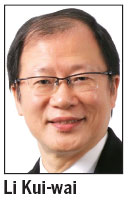Development and welfare: Two economic consequences of Policy Address
Updated: 2014-01-27 08:08
By Li Kui-Wai(HK Edition)
|
|||||||||
The Chief Executive has delivered the Policy Address on Jan 15, 2014. It is in some ways a balanced one that seems to have acknowledged all sectors of the economy. One clear economic drawback is the lack of attention given to the middle class. On the contrary, there is a clear dichotomy between aspects of long-term development potential and short-term expansion in welfare provision.
There are a number of policies that are geared to the long-term development of the economy. In the area of education, the Policy Address promised to increase post-secondary education places. Education has always been a cornerstone of the economy, and there has for years been a pledge to increase post-secondary places. The theme of a knowledge-based economy has been one of the government's objectives. The attention to post-secondary education is particularly important in view of the increase in the number of immigrants since 1997.
The Policy Address also touched on the possibility of land re-zoning for residential purposes. Along these lines is the pledge to re-activate the Home Ownership Scheme (HOS), which was shelved after the Asian financial crisis. This should provide sugar to those intending to own a home, but may not be ready to buy in the private property sector. However, little is mentioned regarding how the revised scheme will be conducted. If the old system was adopted, the same loopholes would emerge once occupiers of HOS were given the right to sell in the private market, thereby creating another supply channel that competed with the private market. Although the Policy Address does provide various numbers in the provision of land and HOS, one wonders how effective and efficient these policy items will be.
Another future aspect is a pledge to widen the economy through new developments on Lantau Island in the form of satellite towns and commercial centers. One would expect massive development projects in the years to come to create new economic developments. Along these lines is a focus on developing technology and upgrading technical skills. However, there is no mention of new industries, nor the role of business and small and medium-sized enterprises.

All these are economic niceties, but one thing in common with these pledges is they take time. Much more government efforts are needed before they can be materialized. Although one hopes the Budget in February can clarify these plans, they are still futuristic and their benefit to the economy uncertain. They will depend on a lot of future steps the government takes.
The other aspect of the Policy Address is huge and immediate extra spending on welfare. Like all other welfare-prone economies, once given, welfare cannot be reduced, and assistance given to one aspect of welfare will lead to demand for other forms of welfare. "Free lunch" provisions will never be enough.
The provision of welfare in Hong Kong has been based on "sympathy-driven" rather than "system-driven", and it often defies the economic trend of the time. In the 1990s when the economy was booming, the then Financial Secretary Donald Tsang kept raising government spending. This resulted in the economy overheating and in inflation. Similarly, when the economy recovered in 2005, welfare kept increasing. A crisis mentality was applied to a non-crisis economy.
Today, there are multiple levels of welfare spending through the Comprehensive Social Security Assistance, the Community Care Fund and welfare items sympathetically favored by the Chief Executive in the annual Policy Address. The belief is that since the Hong Kong fiscal budget faces a surplus, it is time to spend it. Since the Chief Executive is keen on helping needy individuals in Hong Kong, quick spending through the provision of new welfare will become politically popular.
We do not have a crystal ball see whether this will result in a budget deficit or a recession in future. But we can look at experiences in other countries. Welfare spending tended to rise during good economic times in many European countries, which now face high levels of debt. The economy faces business cycles and experiences ups and downs. In times of recession, the economy may not be able to pay all this welfare. The results will be a fiscal deficit and debt will increase. The question then is whether it is fair to impose a debt burden on our future generations by over-spending on welfare for this generation. The lesson one can learn from those "debt-prone" countries is that when their younger generations look for work, they realize that there are few opportunities available to them, because their countries have to find way to repay their debts caused by spending by previous generations. Is this fair to our future generations?
On balance, the Hong Kong economy might lose as the Policy Address is so "welfare-prone". The welfare commitments are immediate, while the provisions for future developments will not materialize until years later - even if everything is being carried out according to the Policy Address. There can also be a "spending-inflation-spending" fiscal trap that the Policy Address promotes. The large welfare commitment will lead to more government spending in the immediate term, and given the current state of the economy with low unemployment and rising wage, the next thing one expects is a rise in inflation. With rising inflation, the government will have to commit more welfare spending to deal with a rise in the cost of living. This will result in calls for more government spending.
The author is associate professor of the Department of Economics and Finance at City University of Hong Kong.
(HK Edition 01/27/2014 page1)